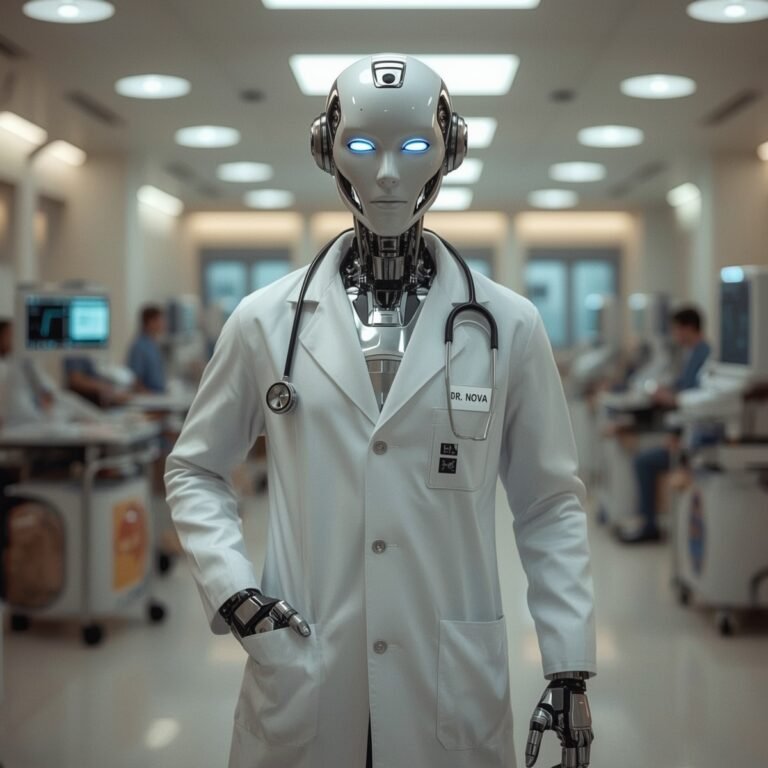Imagine typing the word “cancer” into a search bar, clicking a button, and receiving a fully customized drug formula capable of targeting that disease with unprecedented precision. This once far-fetched concept is now inching closer to reality, thanks to the rapid advancements in artificial intelligence and a groundbreaking project by Google DeepMind’s spin-off, Isomorphic Labs.
In a major announcement, DeepMind CEO Demis Hassabis revealed that the first AI-designed drugs are on track to enter human clinical trials by the end of 2025. This revelation signals a seismic shift in medicine, where the integration of AI could drastically reduce drug development time, costs, and failure rates. If successful, 2025 may be remembered as the year medicine changed forever.
AlphaFold: The Catalyst of Change
The journey to this revolutionary moment began with one of the most celebrated scientific breakthroughs of the 21st century. In 2024, Hassabis and his colleague John Jumper were awarded the Nobel Prize in Chemistry for their work on AlphaFold, an AI system capable of accurately predicting how proteins fold into complex 3D structures.
This achievement cracked a biological puzzle that had stumped scientists for over 50 years. Protein folding is crucial because proteins act as the functional engines of life, enabling processes from bone formation to immune defense. AlphaFold, with near-perfect precision, now predicts these structures in minutes a task that once took years of laboratory research.
The system has already mapped over 200 million known proteins, offering scientists a virtually complete blueprint of the building blocks of life. But the implications go far beyond protein mapping.
From Folding to Curing: Enter Isomorphic Labs
Founded in 2021 as a DeepMind offshoot, Isomorphic Labs took AlphaFold’s capabilities and asked a groundbreaking question: What if AI could not just understand biology but also create medicine?
Under the leadership of Colin Murdoch, the lab is now using advanced AI to design entirely new drugs not just modifications of existing treatments, but brand-new molecular compounds. Their scientists in London are already working alongside AI systems to engineer precision treatments for cancer and other critical diseases.
As Murdoch puts it, “There are people in our office right now collaborating with AI to design drugs from scratch.” This partnership between human researchers and machine intelligence marks a new era in pharmaceutical development.
The $600 Million Bet on the Future
In April 2025, Isomorphic Labs raised $600 million in its first external funding round. Backed by heavyweights like Thrive Capital, Google Ventures, and Alphabet, the investment underscores a deep belief that AI will be the cornerstone of future medicine.
Major pharmaceutical companies have taken notice. Industry titans Eli Lilly and Novartis have inked deals with Isomorphic Labs potentially worth nearly $3 billion. These partnerships aren’t just licensing agreements they are transformative collaborations designed to reshape how drugs are conceived, developed, and approved.
Slashing Timelines and Costs
Today, traditional drug development takes an average of 10 to 15 years and costs over $2.6 billion per approved drug. Success rates are dismal, with just 10% of candidate drugs making it through clinical trials.
AI is poised to obliterate these obstacles. Isomorphic Labs’ approach could reduce drug discovery timelines by up to 90%, compressing years of work into mere months. During the COVID-19 pandemic, BenevolentAI identified a treatment candidate in just three days. Similarly, Recursion Pharmaceuticals cut drug development timelines in half. These early examples hint at a future where AI-driven drug creation is the norm, not the exception.
A Market on the Brink of Explosion
The global AI-driven pharmaceutical market is expected to surge from $1.94 billion in 2025 to $16.49 billion by 2034 a staggering 27% compound annual growth rate. Experts predict that within a year, nearly one-third of all new drugs will be discovered using AI.
Governments and regulatory agencies are also paying close attention. In 2025, the FDA released new guidelines specifically tailored to AI-designed drugs, a move that reflects how quickly this once-hypothetical field is becoming mainstream.
The “Click a Button” Vision
Murdoch is candid about the lab’s ultimate goal. “One day, we hope to be able to say, ‘Here is a disease,’ click a button, and generate a viable drug treatment,” he said.
With the release of AlphaFold 3, the team is getting closer. This latest version not only models protein structures but also simulates interactions with DNA, RNA, and drug molecules. The technology is now capable of creating comprehensive molecular maps that could inform fully customized treatments.
The team at Isomorphic Labs believes that AI can soon reach a 100% confidence level in predicting which drug candidates will succeed in human trials a dramatic improvement from today’s 10% success rate.
Personalized Medicine and a New Era of Healing
The potential benefits for everyday people are extraordinary. Imagine an AI system analyzing your genetic makeup overnight and generating a tailor-made treatment that works specifically with your metabolism. Rare diseases that were once economically unviable to treat could now have customized therapies thanks to reduced R&D costs.
Diseases that have plagued humanity for generations like Alzheimer’s, Parkinson’s, and various forms of cancer could finally see targeted, effective treatments developed in months instead of decades.
The Road Ahead
By the end of 2025, the first humans will be administered drugs created entirely by artificial intelligence. These won’t be slight variations on known treatments, but completely new molecular entities, targeting some of the most formidable diseases known to medicine.
What began as a theoretical dream is now being coded, tested, and soon, trialed in the real world. The button that could one day cure all disease isn’t a fantasy anymore it’s taking shape in labs, guided by algorithms, and backed by billions in investment.
The question is no longer whether AI will transform medicine. The only question that remains: Are we ready for a world where artificial intelligence isn’t just a research assistant, but our partner in healing humanity?



